German Plum Cake with Streusel on shortcrust pastry – the taste of late summer just like grandma used to make! This classic fruit cake with juicy plums, crispy crumble and shortcrust pastry base is a simple recipe for cozy afternoons and coffee mornings. In Germany it is called Pflaumenkuchen or Zwetschgenkuchen.
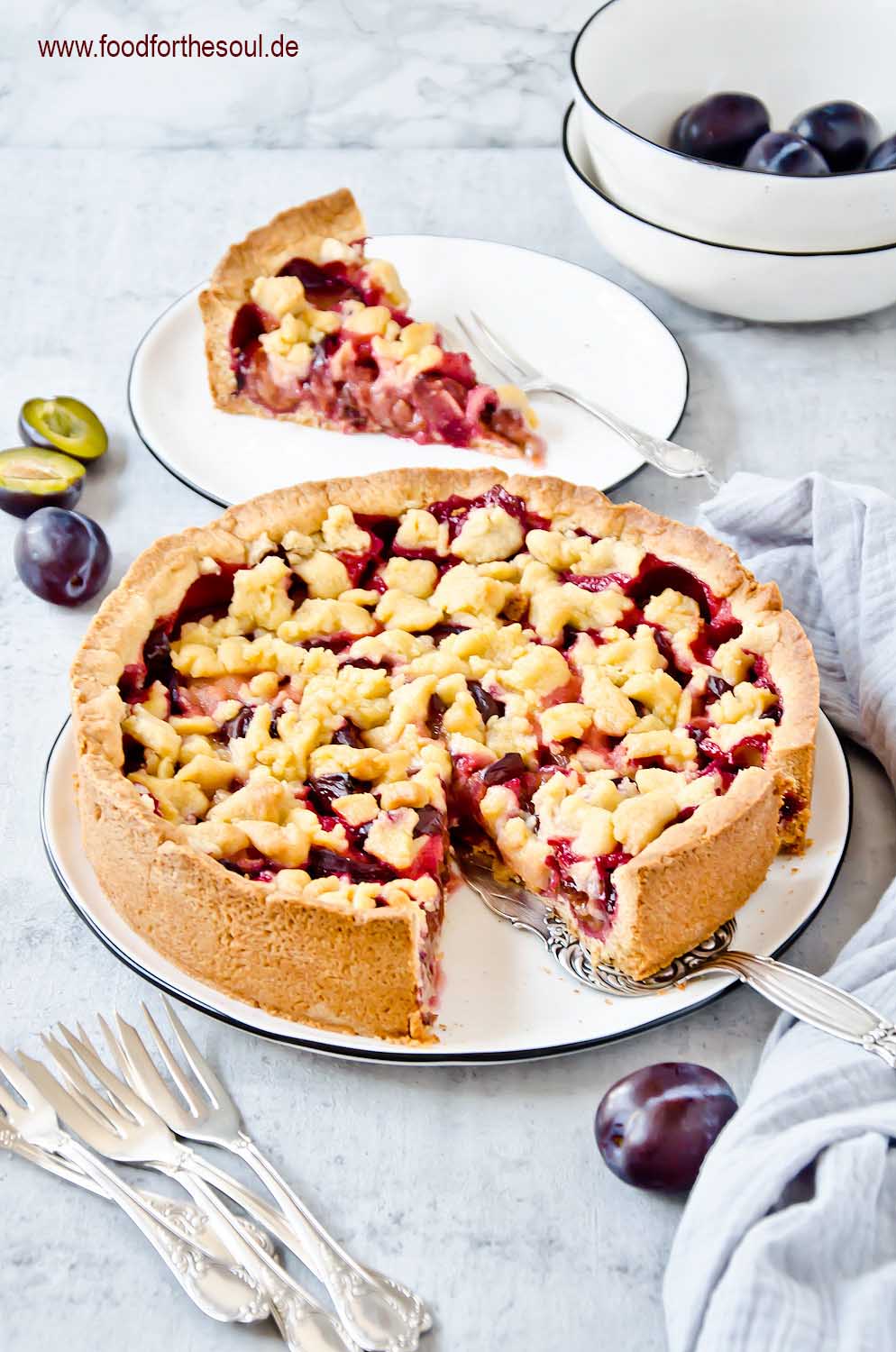
German Plum Cake with crumble on shortcrust pastry – the late summer classic!
This plum tart with crumble on shortcrust pastry is a real classic – simple, baked in a springform pan, sure to succeed and incredibly delicious.
The buttery pastry, sweet plums and crispy crumble go together perfectly and make this cake a highlight of any coffee table. An uncomplicated recipe just like grandma used to make – ideal for plum season!
Do you prefer a sheet cake with plums? Then my quick plum cake with sponge mixture might be something for you.
Too many plums and you don’t know what to do with them? You can use them to make your own delicious plum liqueur or plum jam in the oven!
German Plum Cake – Pflaumenkuchen or Zwetschgenkuchen
There are cakes that taste like childhood – and this plum cake is definitely one of them. Buttery shortcrust pastry, fruity plums and crispy crumble on top – this is pure baking love!
This recipe comes from my grandma and we still bake it the same way today. No frills, but lots of flavor. And the best thing? It really works for everyone.
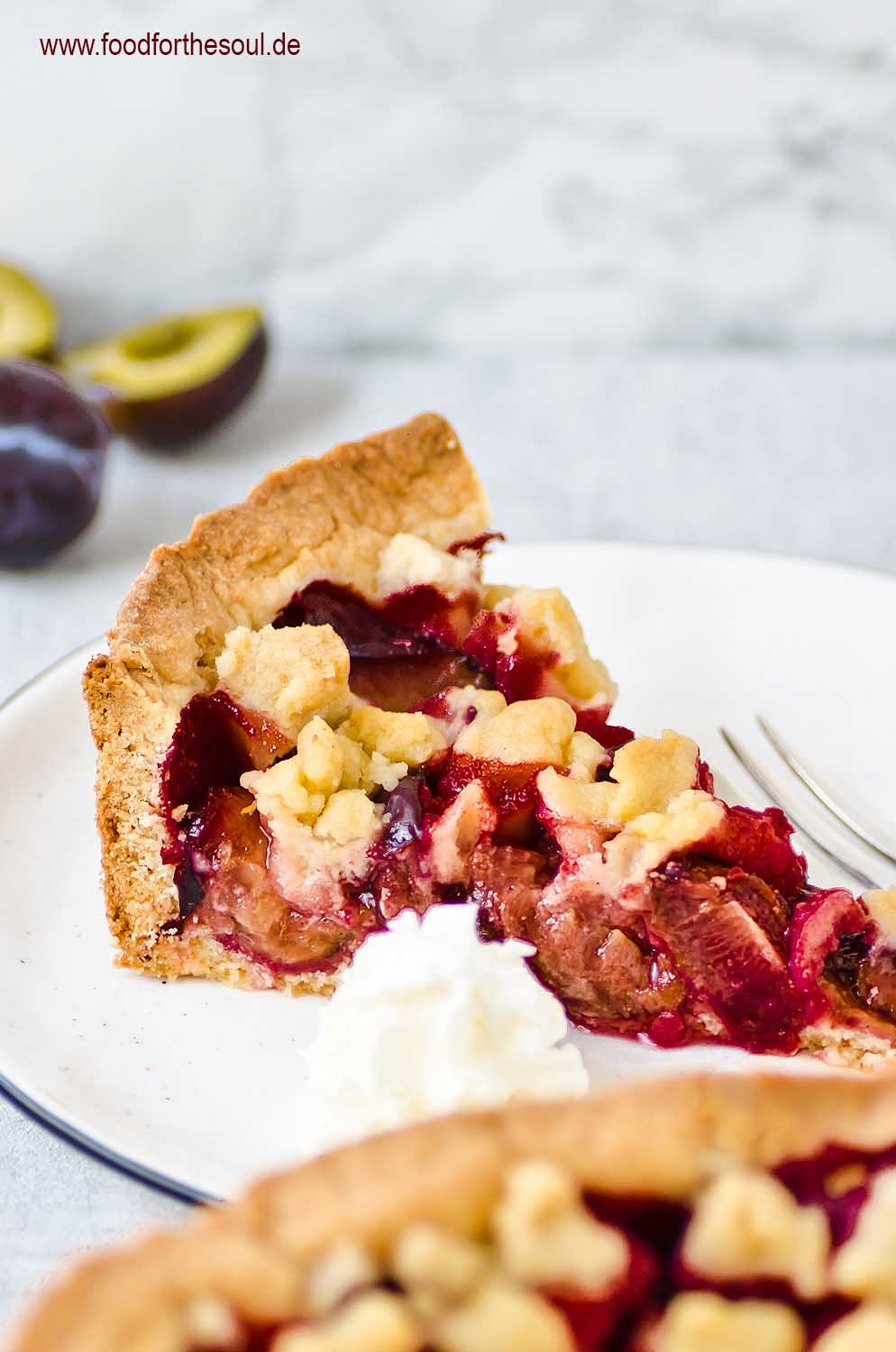
Ingredients for the Plum Cake Recipe at a glance
Shortcrust pastry:
- Flour – The basis for a crumbly, golden-yellow base – preferably all purpose flour or cake flour.
- Sugar – provides a subtle sweetness in the dough, which harmonizes wonderfully with the tartness of the plums.
- Butter – indispensable for the typical taste and the wonderfully crumbly consistency.
- Baking powder – gives the dough a light structure and makes it nice and fluffy.
- Egg – combines all the ingredients to form a smooth batter.
- Pinch of salt – a touch of salt brings out the sweetness even better – as always with good cake batters.
Crumble:
- Flour – the basis for crispy, golden-brown crumbles.
- Butter – to make the crumble crumbly and aromatic – always use cold.
- Sugar – for the subtle sweetness and a nice caramel note when baking.
- Pinch of salt – a small counterpart to the sweetness – provides depth of flavor.
- Cinnamon – adds a warm spice that goes perfectly with plums.
- Cardamom – a hint of it is enough – it gives the crumble that certain something. Optional, but very fine!
Plum topping:
- Zwetschgen (Plums) – juicy, sweet and sour and simply the star of the cake – they should be ripe but still nice and firm. Italian prune plums or Empress plums do the best job.
Pflaume vs. Zwetschge – which fruit is better?
Note the following differences so that your plum cake turns out perfectly:
Zwetschgen
✔ Oval, elongated
✔ Firm flesh – easy to pit
✔ Sweet and sour with a slightly tart note
✔ Low juice content – perfect for baking
✔ Classically suitable for plum cake
Pflaumen
✔ Rounded to egg-shaped
✔ Softer, juicier – sometimes harder to pit
✔ Mild, often sweet taste
✔ Higher juice content – base can become soggy
✔ Only suitable if the fruit is very firm
Incidentally, all plums provide valuable vitamins, fiber and phytochemicals. Healthline.com explains why it is worth enjoying this fruit more often – even in cake form.
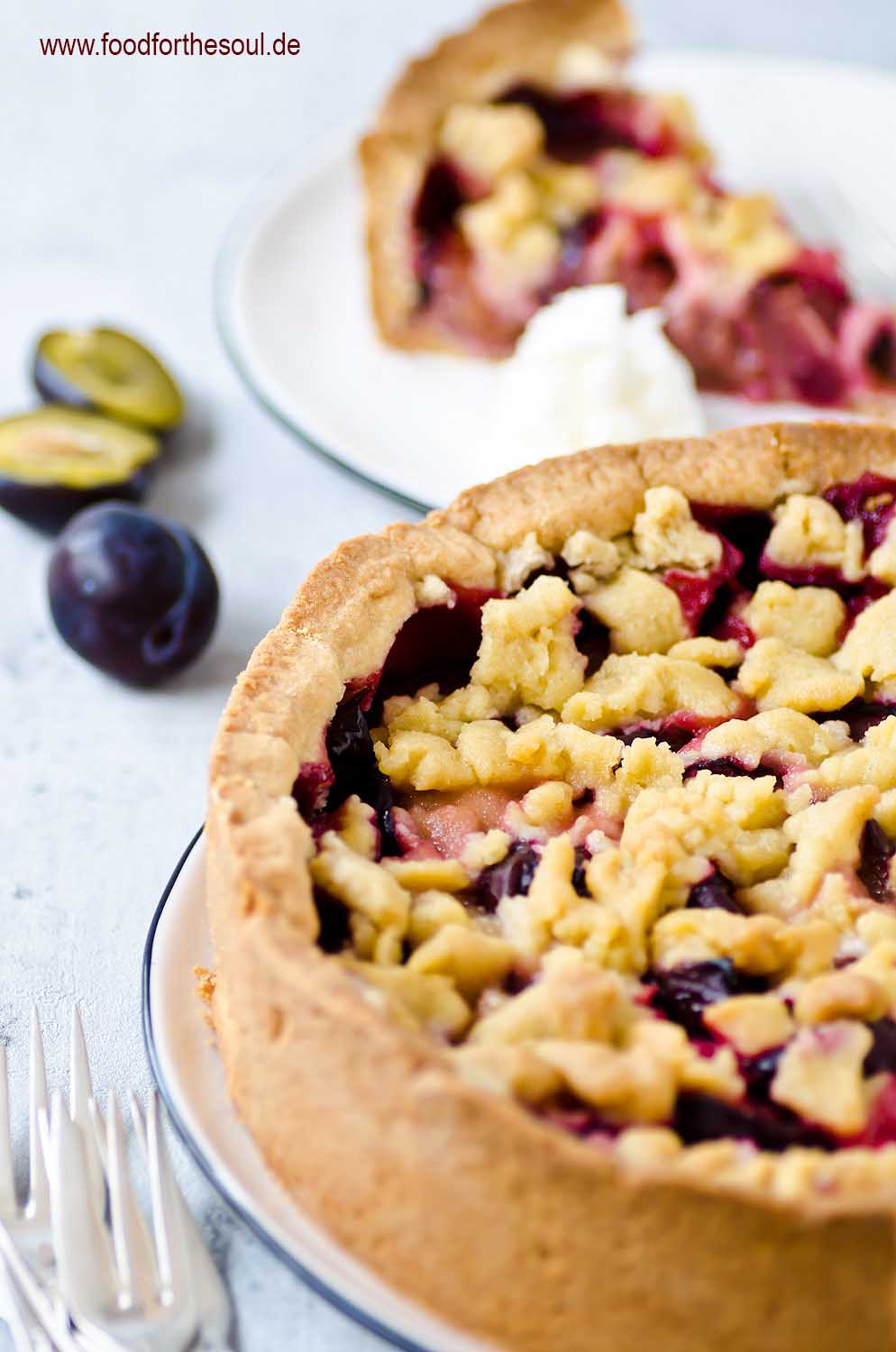
Baking plum cake step-by-step:
Step 1: Prepare & chill the shortcrust pastry
First, knead the shortcrust pastry. This is best done with cool hands or a food processor. Then put it in the fridge for 1 hour to keep it crumbly.
Step 2: Prepare the plums
Wash, halve and pit – it’s quick and easy. I also score the halves slightly so that they can be laid out in a fan shape.
Step 3: Prepare the tin & roll out the dough
Line the base of a springform pan with baking paper. Then grease inner edge of the springform pan and dust with flour.
Take the shortcrust pastry out of the fridge and shape it into a roll. Divide the dough roll into 1/3 and 2/3. Roll out 1/3 of the dough into a circle (the size of the base of the springform pan). Then place the shortcrust pastry on the base of the springform pan.
Roll out the remaining dough (2/3) to a width of approx. 8 cm and line the inside and sides of the springform pan with it. Then press the pastry well into the base and up the inside with your fingers.
Step 4: Place the plums & cover with crumble
Now place the plums in the springform pan from the outside in. I place the plum halves upright on the shortcrust pastry so that they don’t lie flat on the base. This way, the cake is baked nice and high. Then generously spread the crumble on top.
Step 5: Bake the plum cake
Place the cake in the oven at 160 °C (320°F) top/bottom heat for approx. 45-50 minutes on the middle shelf. When the crumble is golden brown and it smells wonderful – take it out!
After baking, leave the plum cake to cool in the tin. Then remove from the springform pan and serve on a cake plate.
Professional tips from grandma & experts
- Use cold butter for shortcrust pastry and crumble – this ensures an extra soft and crumbly texture.
- A teaspoon of fine breadcrumbs on the pastry base absorbs excess moisture.
- Sprinkle a little gelling sugar over the plums before covering with crumble – it binds the escaping fruit juice during baking and the shortcrust pastry base does not become soggy.
- Late, sweet and sour plums such as Hauszwetschgen taste particularly good.
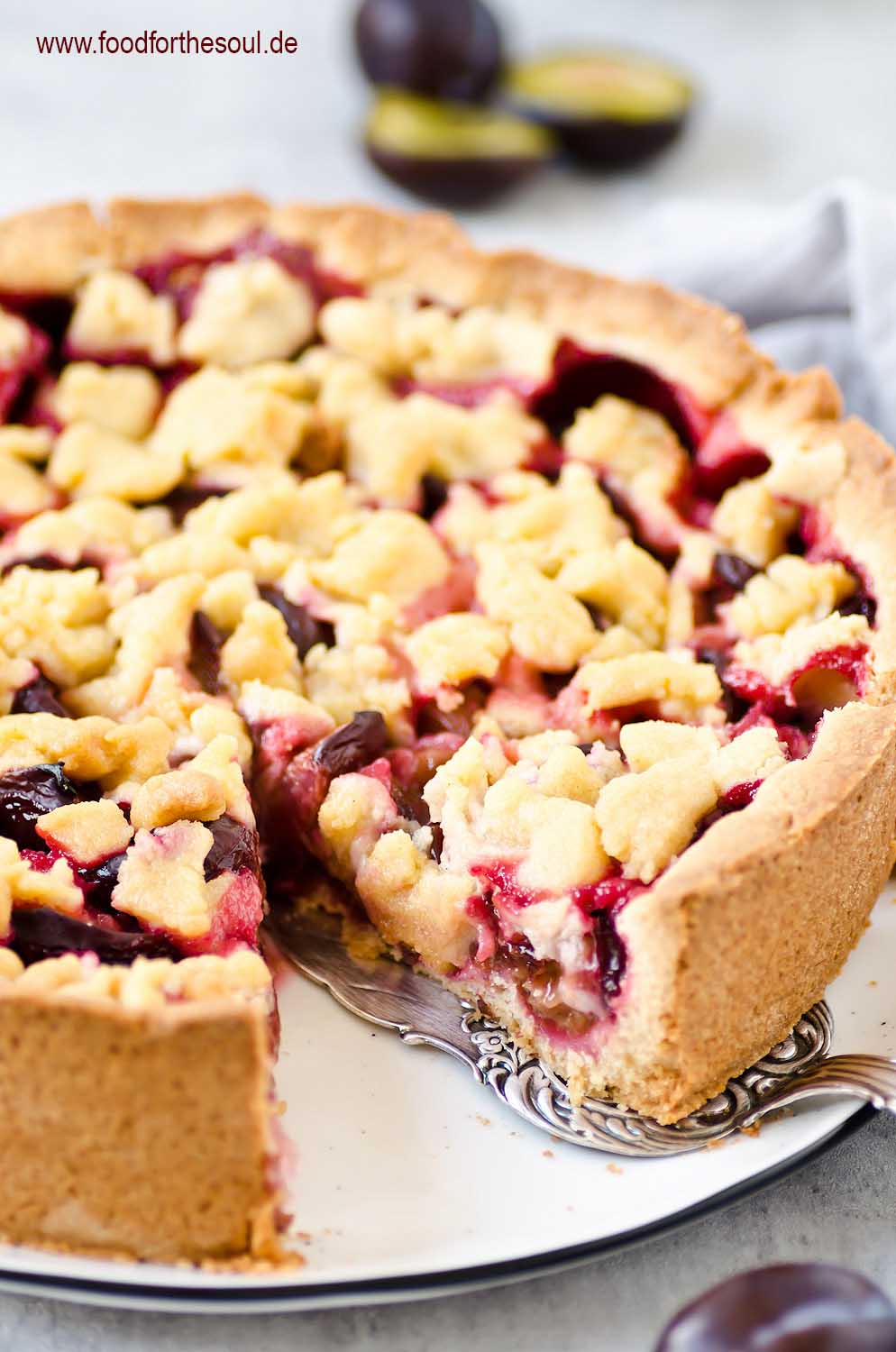
Best way to serve the plum cake
- Best served slightly chilled – lukewarm is a delight
- Combine with a dollop of freshly whipped cream or a scoop of vanilla ice cream.
- Dust with powdered sugar – looks pretty and rounds off the taste.
- Enjoy warm with a spoon of cinnamon yogurt or a cream of mascarpone and curd cheese.
- Serve as a dessert in small pieces with vanilla sauce – perfect for guests.
Storage & shelf life of crumble plum cake
- Room temperature: can be kept covered for 1-2 days.
- In the fridge: fresh for up to 3 days.
- After storing in the fridge, bring to room temperature before serving or bake briefly in the oven at a low temperature.
- Suitable for freezing: Cut the baked and completely cooled cake into pieces, wrap airtight and freeze for up to 3 months. To defrost, simply leave to stand at room temperature for approx. 2 hours.
- The plum cake with crumble tastes best on the baking day or the day after.
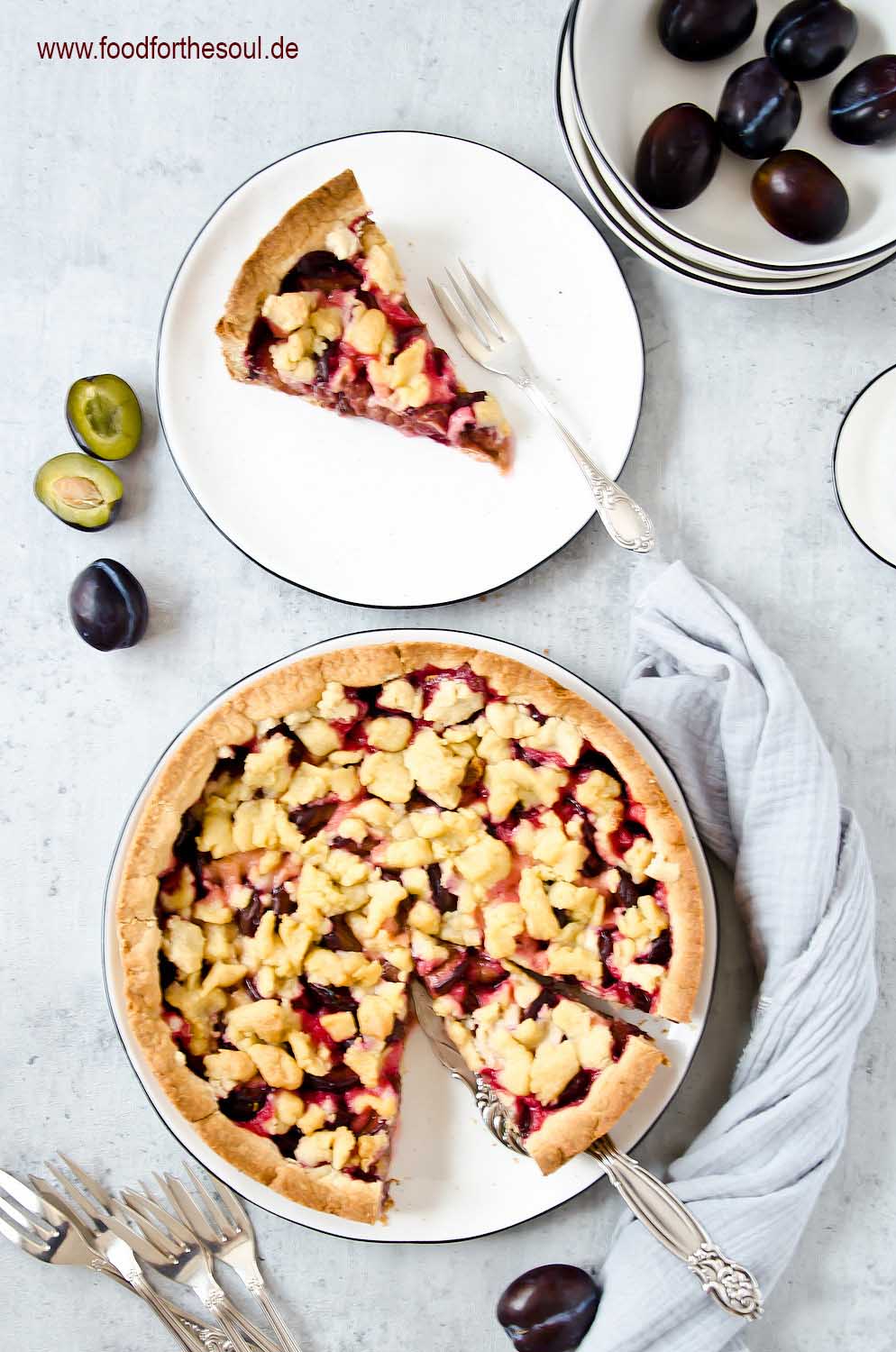
Frequently asked questions about Plum Cake with crumble | FAQ
Yes, this works well – spelt flour provides more flavor. Wholemeal flour makes a rustic dough, but it needs enough liquid (e.g. a little more butter or egg) to prevent it from becoming dry.
The dough usually tears because it is too warm or too dry. Keep it well chilled, work on a lightly floured surface and simply repair cracks with your fingers.
Of course you can: replace the butter with vegetable margarine or coconut oil; the egg can be replaced with apple sauce or soy yoghurt. The batter may then need a little more binding – just try it out.
In addition to the gelling sugar trick, a thin layer of fine breadcrumbs on the pastry base also provides protection.
Use a 1:1 gluten-free flour mix and make sure that the baking powder is also gluten-free. The consistency and taste are similar to the original – just a little more fragile.
Of course! Replace the plums with apples, cherries or pears – for variation in taste. Add chopped nuts such as almonds or hazelnuts to the crumble for extra crunch.
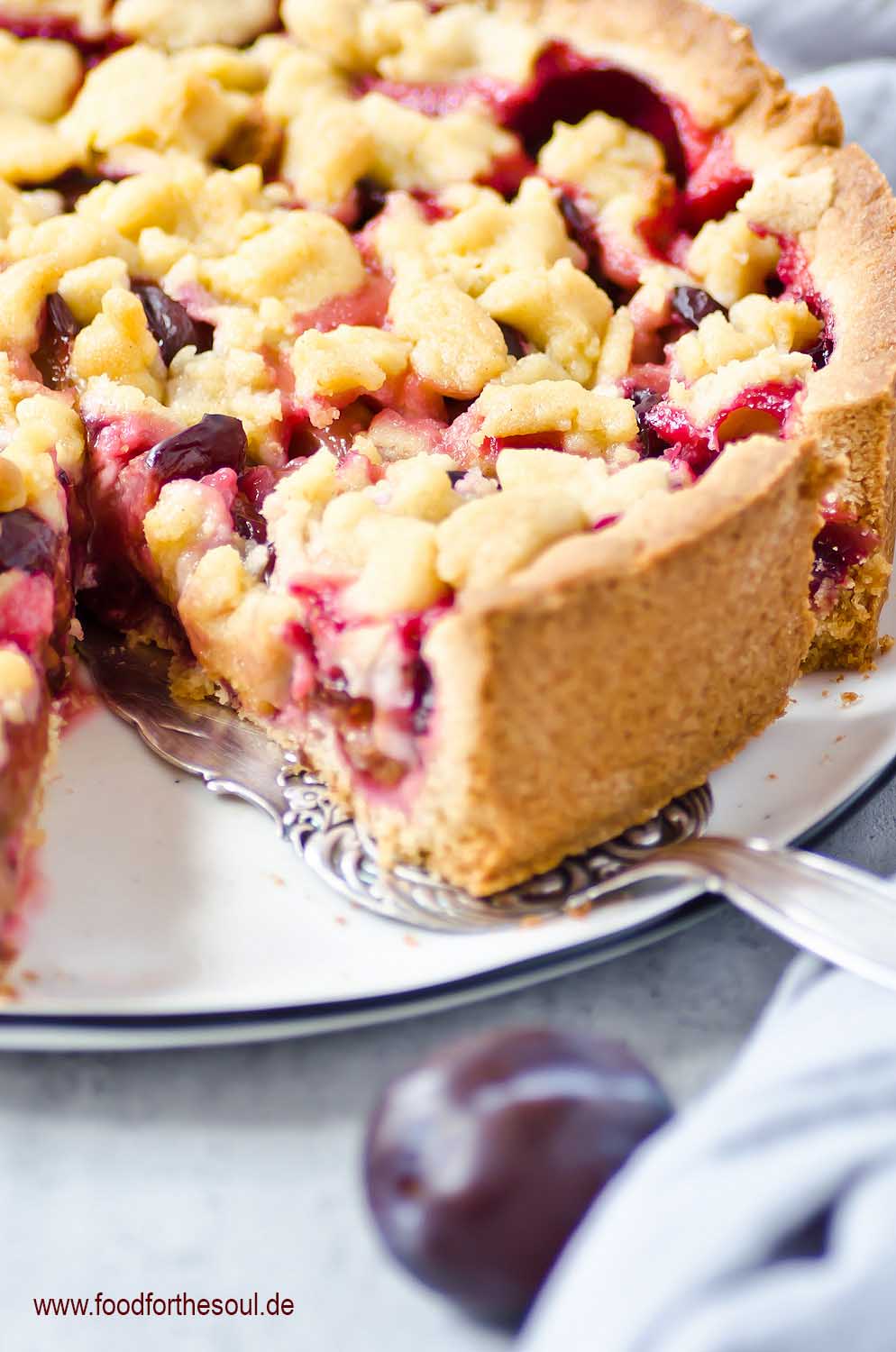
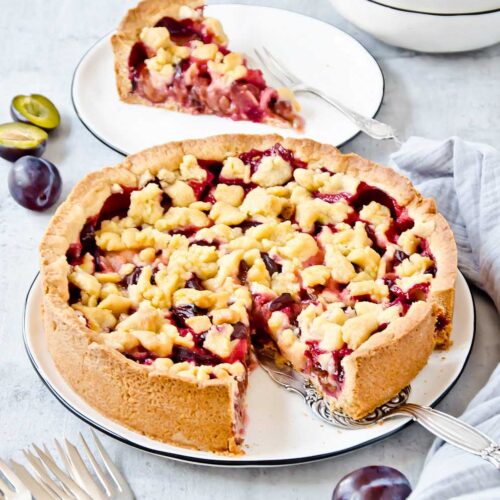
German Plum Cake with Streusel | Pflaumenkuchen
Click stars for rating!Useful kitchen helpers
Ingredients
Shortcrust Pastry:
- 250 g all purpose flour
- 80 g granulated sugar
- 100 g butter
- 1 pinch of salt
- 1 teaspoon baking powder
- 1 egg
Filling:
- 1 kg plums
Streusel:
- 150 g all purpose flour
- 80 g granulated sugar
- 100 g butter
- 1 pinch of salt
- 1/2 teaspoon ground cinnamon
- 1 pinch of ground cardamom
Instructions
Shortcrust pastry
- Make a shortcrust pastry from 250 g all purpose flour, 80 g granulated sugar, 100 g butter, 1 pinch of salt, 1 teaspoon baking powder and 1 egg. Place all the ingredients in a bowl and knead by hand to form a ball of dough. Then wrap the dough in cling film and leave to rest in the fridge for an hour.
- Meantime wash 1 kg plums, remove the stalks, cut in half with a knife and remove the pits.
Streusel
- Pour 150 g all purpose flour, 80 g granulated sugar, 100 g butter, 1 pinch of salt, 1/2 teaspoon ground cinnamon and 1 pinch of ground cardamom into a bowl and knead by hand. The dough is moist and not crumbly, reminiscent of shortcrust pastry. Put the bowl with the crumble dough to one side.
- Line the base of a springform pan with baking paper. Then grease the inside of the pan and dust with flour.
- In the meantime, preheat the oven to 160°C or 320°F.
Topping the cake
- Take the shortcrust pastry out of the fridge and shape into a roll. Divide the roll into 1/3 and 2/3. Roll out 1/3 of the dough into a circle (the size of the base of the springform pan). Then place the shortcrust pastry on the base of the springform pan.
- Roll out the remaining dough (2/3) to a width of approx. 8 cm and line the inside of the springform tin with it. Then press the pastry down well on the base and inside with your fingers. If the top edge looks a little “frayed”, you can smooth it out with your fingers.
- Place the halved and pitted plums in the springform pan from the outside in. I place the plum halves upright on the shortcrust pastry so that they don’t lie flat in the cake. This way, the cake is baked nice and high.
- Spread the crumble over the cake. Pluck small pieces of crumble from the dough and sprinkle them over the plums.
- Place the cake in the oven and bake for approx. 50 minutes. After baking, leave the plum cake to cool in the tin.
Notes
Nutrition
These figures are guidelines and were calculated using a recipe calculator.
Also try these quick summer cake recipes:
No posts